

Le cognitivisme : schéma intégrateur. Welcome to Cogprints - Cogprints. Internet use 'good for the brain' For middle-aged and older people at least, using the internet helps boost brain power, research suggests.
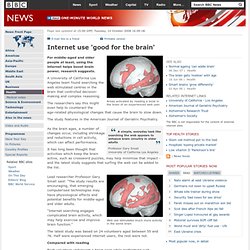
A University of California Los Angeles team found searching the web stimulated centres in the brain that controlled decision-making and complex reasoning. The researchers say this might even help to counteract the age-related physiological changes that cause the brain to slow down. The study features in the American Journal of Geriatric Psychiatry. Musicians spot mistakes more quickly and more accurately than non-musicians - Science - News. The study, led by Dr Ines Jentzsch for the University of St Andrews, tested the cognitive abilities of musicians and non-musicians, with the research concluding that learning an instrument could “slow or even prevent” the mental decline associated with aging.

The research, published in the journal Neuropsychologia, draws particular attention to the skills learnt in musical performance. When playing pieces to an audience or to themselves musicians must demonstrate heightened awareness of their actions: continually monitoring their playing through auditory feedback and rapidly adjusting their movements to anticipate possible mistakes. Xinwei/classes/readings/Maturana/autopoesis_and_cognition.pdf. Literature, Cognition & the Brain. Cognitive Science Celebrities. Cognitive/ Learning Styles. Cognitive styles and learning styles refer to the preferred way an individual processes information or the different ways in which children and adults think and learn.
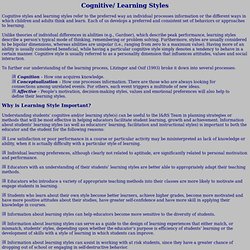
Each of us develops a preferred and consistent set of behaviors or approaches to learning. Unlike theories of individual differences in abilities (e.g., Gardner), which describe peak performance, learning styles describe a person’s typical mode of thinking, remembering or problem solving. Furthermore, styles are usually considered to be bipolar dimensions, whereas abilities are unipolar (i.e., ranging from zero to a maximum value). Having more of an ability is usually considered beneficial, while having a particular cognitive style simply denotes a tendency to behave in a certain manner. Cognitive style is usually referred to as a personality dimension that influences attitudes, values and social interaction. The International Institute of Cognitive Informatics and Cognitive Computing. The International Institute of Cognitive Informatics and Cognitive Computing (ICIC)
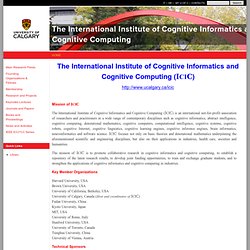
Kingston Distributed Cognition Group. Cognitive Domain. 2-IJCINI-4101-CI&CC.pdf. CognitiveInformaticsCognitiveSynergyPaper_v1 - CognitiveSynergy.pdf. Socially distributed cognition. Distributed cognition is a psychological theory that knowledge lies not only within the individual, but also in the individual's social and physical environment.
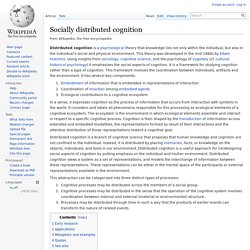
This theory was developed in the mid-1980s by Edwin Hutchins. Using insights from sociology, cognitive science, and the psychology of Vygotsky (cf. cultural-historical psychology) it emphasizes the social aspects of cognition. It is a framework for studying cognition rather than a type of cognition. This framework involves the coordination between individuals, artifacts and the environment.
It has several key components: Wiki : CognitiveSynergy. Cognitive Synergy - "The state wherein two or more cognitions achieve a level of cooperation which results in an intellectual output greater than the sum of their individual contributions.
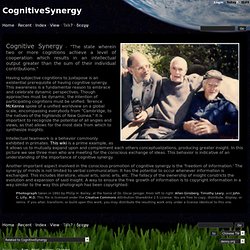
" Having subjective cognitions to juxtapose is an existential prerequisite of having cognitive synergy. This awareness is a fundamental reason to embrace and celebrate dynamic perspectives. Though approaches must be dynamic, the intention of participating cognitions must be unified. Terence McKenna spoke of a unified worldview on a global scale, encompassing everybody from "Cambridge, to the natives of the highlands of New Guinea. " It is important to recognize the potential of all angles and views, as that allows for the most data from which to synthesize insights. Intellectual teamwork is a behavior commonly exhibited in primates. Another important aspect involved in the conscious promotion of cognitive synergy is the 'freedom of information.' A new era of cognitive computing. IBM says it is possible to build a new computing architecture that is more human-like and biologically inspired than traditional systems.

After a year of “medical school”, IBM’s intelligent supercomputer, Watson, has produced its first commercially available applications for doctors and health insurance companies. Now that Watson is proving itself in the medical field, the door is being flung open for other industries and a new era of cognitive computing. According to IBM, Watson’s performance has improved by 240% since it rose to prominence by beating the reigning human champions at the popular US quiz show, Jeopardy, two years ago. Vers un capitalisme cognitif ? > Fonda. Vous trouverez ci-dessous une synthèse des échanges du petit déjeuner organisé par la Fonda et la Maison de l’Europe de Paris avec le soutien de la Caisse des Dépôts, inititulé Vers un capitalisme cognitif ?
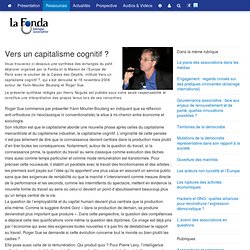
, qui s’est déroulée le 19 novembre 2008 autour de Yann-Moulier Boutang et Roger Sue. La présente synthèse rédigée par Henry Noguès est publiée sous notre seule responsabilité et constitue une interprétation des propos tenus lors de ces rencontres. Roger Sue commence par présenter Yann Moulier-Boutang en indiquant que sa réflexion anti-orthodoxe (ni néoclassique ni conventionaliste) le situe à mi-chemin entre économie et sociologie. Son intuition est que le capitalisme aborde une nouvelle phase après celles du capitalisme mercantiliste et du capitalisme industriel, le capitalisme cognitif. L’originalité de cette pensée n’est pas tellement de dire que la connaissance devient centrale dans la production mais plutôt d’en tirer toutes les conséquences.
La Pollinisation ? Competencies: educational objectives - Text Description. Cognition. Cognition is a faculty for the processing of information, applying knowledge, and changing preferences. Cognition, or cognitive processes, can be natural or artificial, conscious or unconscious.[4] These processes are analyzed from different perspectives within different contexts, notably in the fields of linguistics, anesthesia, neuroscience, psychiatry, psychology, philosophy, anthropology, systemics, and computer science.[5][page needed] Within psychology or philosophy, the concept of cognition is closely related to abstract concepts such as mind, intelligence.
It encompasses the mental functions, mental processes (thoughts), and states of intelligent entities (humans, collaborative groups, human organizations, highly autonomous machines, and artificial intelligences).[3] Etymology[edit] Origins[edit] Metacognition. Metacognition is defined as "cognition about cognition", or "knowing about knowing".
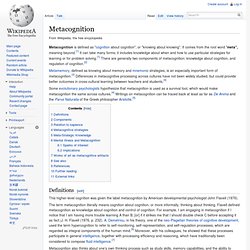
It comes from the root word "meta", meaning beyond.[1] It can take many forms; it includes knowledge about when and how to use particular strategies for learning or for problem solving.[1] There are generally two components of metacognition: knowledge about cognition, and regulation of cognition.[2] Metamemory, defined as knowing about memory and mnemonic strategies, is an especially important form of metacognition.[3] Differences in metacognitive processing across cultures have not been widely studied, but could provide better outcomes in cross-cultural learning between teachers and students.[4] Some evolutionary psychologists hypothesize that metacognition is used as a survival tool, which would make metacognition the same across cultures.[4] Writings on metacognition can be traced back at least as far as De Anima and the Parva Naturalia of the Greek philosopher Aristotle.[5] Definitions[edit] [edit]
Cognition in the Wild. By Edwin Hutchins, Published by MIT Press, 1995.
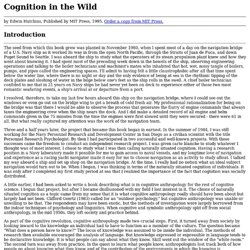
Order a copy from MIT Press. The seed from which this book grew was planted in November 1980, when I spent most of a day on the navigation bridge of a U.S. Navy ship as it worked its way in from the open North Pacific, through the Straits of Juan de Fuca, and down Puget Sound to Seattle. I was aboard the ship to study what the operators of its steam propulsion plant knew and how they went about knowing it. Distr.CognitionFramework-final - Distr.CognitionFramework.pdf. MetaCogs. Metacognition. This article or section is incomplete and its contents need further attention. Some sections may be missing, some information may be wrong, spelling and grammar may have to be improved etc. Use your judgment! 1 Definition Metacognition can be considered a synonym for reflection in applied learning theory. Cognitive Style as Environmentally Sensitive Individual Differences in Cognition. A Modern Synthesis and Applications in Education, Business, and Management Maria Kozhevnikov, Harvard Medical School, Department of Radiology, Athinoula A.
Martinos Center for Biomedical Imaging, 149 Thirteenth St., Charlestown, MA 02129 E-mail: mkozhevn@nmr.mgh.harvard.edu Abstract The key aims of this article are to relate the construct of cognitive style to current theories in cognitive psychology and neuroscience and to outline a framework that integrates the findings on individual differences in cognition across different disciplines. Théorie du cerveau triunique. Un article de Wikipédia, l'encyclopédie libre. Introduit par Paul Mac Lean en 1969, cette vision de l'organisation neuroanatomique est un outil théorique, aujourd'hui controversé, permettant de modéliser l'architecture fonctionnelle du cerveau et l'organisation générale de ses principales aires en relative interdépendance.
Phylogénie du cerveau triunique[modifier | modifier le code] Le cerveau reptilien[modifier | modifier le code] Intelligence Collective et cerveau triunique. Intelligence Collective et cerveau triunique De l’Intelligence Collective à l’Intelligence Collaborative. Evolution of evolvability. Evolution of Evolvability This paper shows how evolution tunes the content and frequency of genetic variation to enhance its evolvability.
Genetic evolution is not random or entirely blind. Genetic systems are like nervous systems and brains—they have been structured and organised by evolution to enhance their ability to discover effective adaptations. (For a more general approach to the evolution of evolvability, see Chapters 8 to 12 inclusive of the on-line book Evolution's Arrow. It examines in detail how evolution itself has evolved. (a final version of this paper was published in the Journal of Social and Evolutionary Systems (1997) 20: 53-73.) The Triune Brain. Cognitive psychology. Thinking Traps. Une archéologie de la perception sensorielle. How Homo became Sapiens – on the Evolution of Thinking.
List of thought processes. Nature of thought[edit] Thought (or thinking) can be described as all of the following: An activity taking place in a: brain – organ that serves as the center of the nervous system in all vertebrate and most invertebrate animals (only a few invertebrates such as sponges, jellyfish, adult sea squirts and starfish do not have a brain). It is the physical structure associated with the mind. mind – abstract entity with the cognitive faculties of consciousness, perception, thinking, judgement, and memory. Having a mind is a characteristic of humans, but which also may apply to other life forms.[1][2] Activities taking place in a mind are called mental processes or cognitive functions.computer (see automated reasoning, below) – general purpose device that can be programmed to carry out a set of arithmetic or logical operations automatically.
Types of thoughts[edit] Cognitive Assessment System. Das-Naglieri Cognitive Assessment System (CAS) test is an individually administered test of cognitive functioning for children and adolescents ranging from 5 through 17 years of age that was designed to assess the Planning, Attention, Simultaneous and Successive cognitive processes as described in the PASS Theory of Intelligence. History[edit] CAS development began with an attempt to offer an alternative to the IQ test (Das, Kirby & Jarman, 1975,[1] 1979[2]). Developed and published in 1997 by J.P. Cognition Factor. Cognitive Psychology and Cognitive Neuroscience. Genes to Cognition Online.